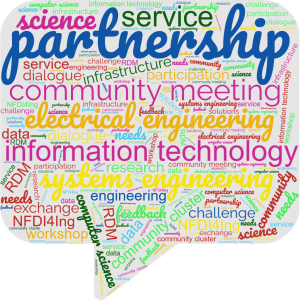
NFDI4Ing is committed to addressing engineers of all disciplines. It aims to develop method-oriented and low-threshold approaches and services for reliable and practical research data management. Therefore, it is a central task for the consortium to enter a dialogue with the scientific community. On the one hand, we continuously want to record needs and obtain feedback, thus ensuring that we keep up to date with the requirements and challenges of engineering researchers. On the other hand, we want to disseminate services, solutions, and knowledge gained in NFDI4Ing back into the community. In addition to scientists, NFDI4Ing also addresses infrastructure providers, data stewards and service providers in the scientific environment of engineering.
NFDI4Ing approaches these communities by means of our Community Clusters, which align with the subject classification system of the German Research Foundation (DFG). In this classification, the engineering sciences are sub-divided into five groups, each representing different branches of engineering research: Mechanical and industrial engineering (CC41), Thermal engineering and process engineering (CC42), Materials science and engineering (CC43), Computer science, systems and electrical engineering (CC44), and Construction engineering and architecture (CC45).
Research Data Management within the framework of Community Cluster 44
As described above, Community Cluster-44 covers the research areas systems engineering, electrical engineering, information technology and computer science. In the past two years, the team responsible for CC-44 was able to establish a dialogue within the community through, but not limited to, the establishment of a community board, presentations and exchange formats in the context of a community meeting, networking with infrastructure partners, and individual interviews with experts of the scientific field. This work with the community has produced a number of key results:
- Dealing with research data takes without doubt a high priority in scientific work. However, the knowledge of systematic research data management, as well as available tools and processes, has so far mostly been available in rudimentary form.
- The community certainly sees the potential and importance of making data available and visible to the public. However, a sustainable culture of research data management still needs to be established and requires a long-term process. In particular, support for implementation and continuous knowledge transfer will be important.
- We also find that a strong desire for best practice examples exists within the community. Furthermore, providing exemplary data sets as benchmarks for the comparison with one’s own data has been marked as a helpful service for scientists.
- The legal basis of data management remains a major challenge, especially when personal, licensed and proprietary data is involved.
- While some disciplines are already using specific ontologies tailored to their research area, such ontologies do not yet exist in other disciplines. Finally yet most importantly, it became clear that while open, universal data standards are a great asset, there is a need for support in their use and establishment.
What to expect in the future?
NFDI4Ing as a whole will continue to address the needs of its community and all engineering research areas with its ongoing actions. Over the course of numerous past events, it has become clear that low-threshold and focused events offering the most practical content possible are much appreciated and preferred by the scientific community. The task for future NFDI4Ing events, especially in the context of the work of the community clusters, will be to organize the exchange with this framework in mind. We cordially invite all interested parties to participate in NDFI4Ing and contribute their perspectives and use cases to benefit the future of RDM in engineering.
Sebastian Schaarschmidt, SLUB Dresden
